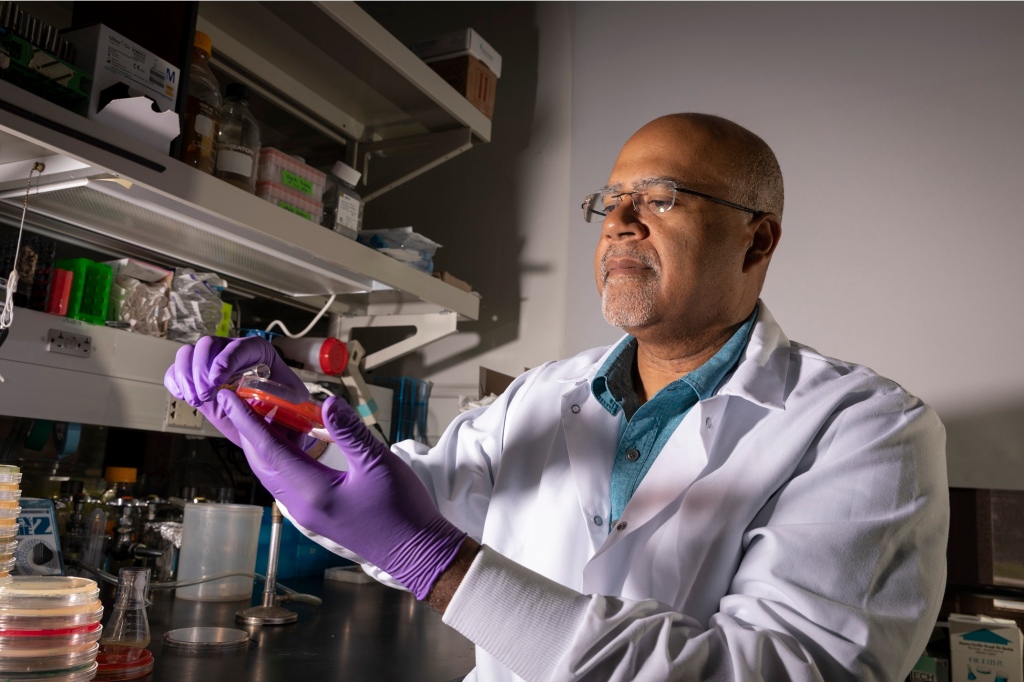I am a big fan of Dr Paul Turner from Yale University. He is good at many, many things. He is a very successful scientist (member of the National Academy of Sciences), has held several different administrative positions, created a company and does important science outreach work, including lectures available on YouTube.
I first met Dr Turner at the GRC microbial population biology conference he chaired in 2013. This was my first GRC meeting and I was impressed and inspired. The science was super exciting and the meeting was more diverse than any meeting I had ever been too.
His work as an evolutionary biologist who studies microbes is just amazing. I first got to know him for his basic evolutionary work on adaptation in viruses. Later, I learned about his work using evolutionary principles to prepare phage cocktails to treat people who suffer from drug resistant bacterial infections. For me, that phage work is one of the coolest applications of evolutionary principles ever. Here is Dr Turner doing a TED talk about that work:
The interview below is meant for a book chapter for a book about evolution for German high schools, but Dr Turner allowed me to print it here as well.
Pleuni: Can you tell me what your job is?
Dr Paul Turner: I am both a professional scientist as well as an educator, in my job as Professor of Ecology and Evolutionary Biology at Yale University in New Haven, Connecticut, USA. Most of my time is spent running a large and active research group, composed of postdoctoral, graduate student and undergraduate scientists doing projects on virus ecology, evolution and genetics. I educate them through mentoring and training, either working with them on projects one on one or in collaborative groups, often involving other scientists at Yale and elsewhere. My job as an educator also involves classroom instruction in undergraduate courses, and leading seminars taken by graduate students.
Pleuni: Did you always want to become an evolutionary biologist? If not, what made you become an evolutionary biologist?
Dr Paul Turner: My fascination with evolutionary biology occurred around the time that I attended middle school and high school, nearby Syracuse, NY. I’ve always been an avid reader of science fiction, but my go-to nonfiction books at that time usually concerned the evolution of biodiversity, especially collected essays by Stephen J. Gould, the deceased Harvard paleontologist who was a prolific essayist for Natural History magazine. I greatly enjoyed reading Gould’s essays on evolution, geared to a lay audience.
It was during graduate school that I became obsessed with microbial biodiversity, and the awesome power of microbes as models for rigorously studying evolution questions, and the need to understand the ecology and evolution of microbes, the most abundant and biodiverse inhabitants of Earth. Unlike most microbiologists, my lab conducts research on a broad diversity of microbes, including a wide variety of viruses and bacteria that do and do not cause diseases in humans. Essentially, my childhood fascination with biodiversity prompted me to establish an ever-expanding microbial zoo in my laboratory, harnessed for studying an equally diverse set of basic and applied questions relevant for microbial evolution.
Pleuni: Why are phages a good tool to treat antibiotic resistant infections?
Dr Paul Turner: Ever since phages were discovered around the early 1900’s, scientists started examining the successful abilities for phages to kill bacteria infections in animals and people. One important researcher in these early efforts to do phage therapy was the co-discoverer of phages, Felix d’Herelle. There are many benefits of this approach, especially the ability for lytic phages to kill specific bacterial cells while releasing hundreds of new virus particles that can repeat the process in other susceptible cells; this is a rare example of a self-amplifying drug. Also, phage therapy seems to be generally safe for humans and causes few if any side effects, as long as the phage preparation is carefully produced to remove any dangerous bits and pieces of the bacterial cells that were destroyed while preparing phage doses; otherwise, these cell remnants are endotoxins that can cause a bad physiological response in the patient. However, phage therapy became unpopular in Western countries only a few decades after d’Herelle’s work, as these scientists and physicians instead invested in the development antibiotics to treat bacteria diseases, following Alexander Fleming’s discovery of penicillin. Now that antibiotics are failing worldwide in their usefulness to treat antibiotic resistant bacteria, there is resurged interest in phage therapy as a possible alternative. Today we have much better microbiology tools and understanding of phage biology compared to the early 1900’s, when there was suspicion that the biological variability of phage doses was less trustworthy than purely chemical preparations of antibiotics. This gives us better confidence that these viruses can help treat infections, since antibiotics are waning in efficacy.

Pleuni: What is the most fun part of your job?
Dr Paul Turner: I have always enjoyed the challenge of experimental design, which is a very fun and creative process. There are endless mysteries in the natural world, but it is not trivial to design a biological experiment properly to test a hypothesis. I greatly enjoy interacting with members of my lab group and with other scientists, as we grapple with different ways to test our ideas using data generated in the laboratory, and by analyzing biological samples from natural environments or the human body. The ease and efficiency of growing many microbes in this process allows us to generate results quickly, and to rapidly address different hypotheses in a relatively short amount of time.What part of your job do you find difficult?
Pleuni: What part of your job do you find difficult?
Dr Paul Turner: I greatly enjoy teaching in the classroom, but I am often amazed how much time and preparation is needed to create a well-organized and useful lecture. This is a difficult process, even though it is incredibly rewarding when I am successful in transferring knowledge to my students. It can be even more challenging to present complex scientific data and ideas to a lay audience of non-scientists, but I find this difficult task to be essential; I believe modern day scientists should embrace our role in trying to explain why science is important and how it impacts everyone’s daily lives.
Pleuni: You are from the United States, but worked in Spain too, right? Did you like living and working in a foreign country?
Dr Paul Turner: I am incredibly grateful that I had an opportunity to live and work outside of the USA during my professional training, as this gave me a glimpse into how scientists in other cultures may approach similar problems in different ways. Unraveling the complexities of the natural world benefits from applying different viewpoints and life experiences, which alone reminds us why it is important for science to embrace diversity of the individuals studying it.
Pleuni: Do you always do science or do you have other interests too?
Dr Paul Turner: I love science, but I am passionate about many other things as well. I have a spouse and two daughters, and we enjoy getting outside for hikes and other recreational activities in natural lands, such as forests and the beach. Also, I have always enjoyed listening to music, and have a large collection of vinyl records that has grown ever since my childhood. I also like to read books for pleasure (not just for work), and especially enjoy science fiction novels and look forward to seeing movies made from them.
Pleuni: You have published many research articles and given many lectures. Do you like writing articles and giving lectures?
Dr Paul Turner: Yes, I find writing to be very enjoyable and perhaps the only downside is that scientific writing can be rather formulaic. Therefore, I also try to write review and opinion articles, where I can express my creativity a bit more. My goal is to write a science fiction novel some day!
Pleuni: Do you think drug resistance will ever be solved?
Dr Paul Turner: I believe that drug resistance will always prove challenging for humans, as we grapple with emerging pathogens that threaten the health of humans, as well as that of domesticated plants and animals, and species that we are trying to preserve through conservation biology efforts. Thus, I admit that I am pessimistic that we will ever truly conquer the problem of drug resistance. However, I am increasingly optimistic that better science and engineering tools and expanded perspectives on the natural world will allow us to use creative approaches to solve difficult societal problems, including the challenges of drug resistant pathogens.
If you would like to learn more, have a look at Dr Turner’s website.

